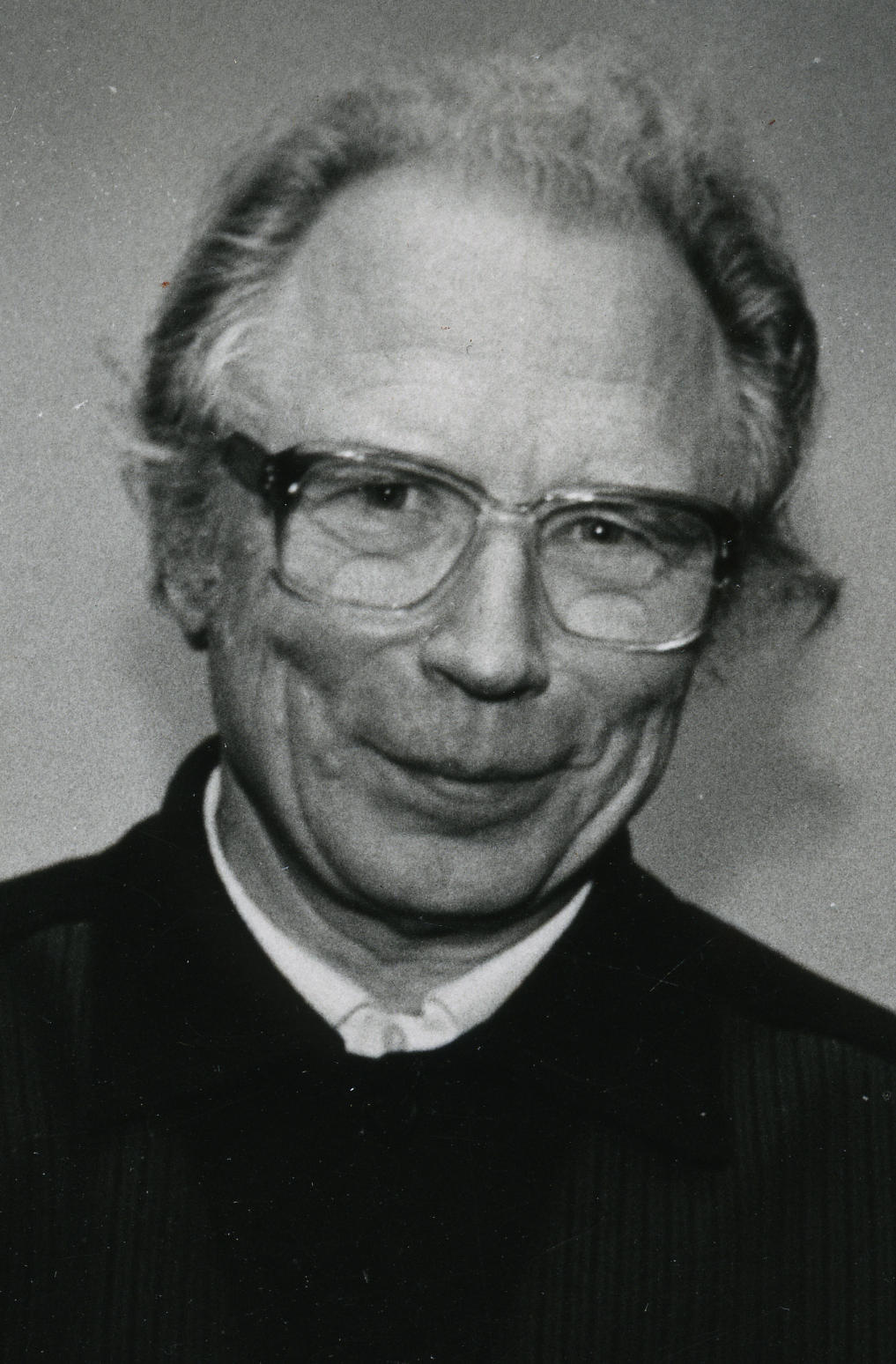
Harri Jõgisalu
Harri Jõgisalu (until 1936 Harri Konstabel, 24. VIII 1922 – 18. IX 2014) was an Estonian children’s author, known primarily for his stories of nature and traditional rural life.
Jõgisalu was born at Rüüsmaa farm in Korju village, Paadrema parish in Läänemaa county. At the age of eight, after his mother’s death, he moved to Tallinn with his father. In 1936 he completed Paadrema primary school, and in 1941 Tallinn Secondary School of Business. At the beginning of the Second World War he held a teacher’s post at Martna primary school and a headmaster’s post at Rõude primary school; during the war he served in the German army and from 1944 he spent two years as a prisoner of war at Parakhino in Russia.
After returning from the war, in 1950 graduated in biology and geography from the Tallinn Teachers’ Institute, and in 1955 from the Leningrad Pedagogical Institute as a teacher of chemistry and biology. Thereafter he worked as a teacher, first at Saulepi primary school, and later served for more than thirty years at Märjamaa Secondary School (1947-1978), where he wrote plays for children, established a ‘nature corner’ and started writing stories. In 1962 Jõgisalu received an award as a Merited Teacher of the Estonian SSR, and made his debut as a writer in 1967 with his first book, Käopoja tänu (‘The Cuckoo-chick’s Thanks’).
From 1977 he was a member of the Estonian Writers’ Union, from 1978 to 1984 a professional author, from 1984 to 1990 the Estonian Writers’ Union’s consultant on foreign relation, and from 1990 to 1992 the secretary to its board. From 1960 to 1991 he belonged to the CPSU. Jõgisalu spent his last decades at Märjamaa as a freelance writer.
He wrote many animal stories for children and young people, drawing a philosophy of life from them. Jõgisalu’s books exalting the beauty of Estonia are in their way a reflection of his times, a landmark of the days where the children’s playground was, rather than the screens of today, the forests, meadows, flood-plains and pasture-lands, which offered a host of opportunities to discover the wonders of nature and follow the lives of animals, with no hurry to get anywhere, but going slowly and noticing one’s surroundings. Just as important as the nature of his homeland to him was the wisdom of his forefathers being carried forward, and care for natural heritage.
He translated two books for young people from German (Mirjam Pressler’s novel Kui õnn saabub, paku talle istet (‘When happiness arrives, offer it a seat’, Kupar, 2000) and Marjaleena Lembcke’s Suvi, kui kõik oli armunud (‘The Summer when Everyone was in Love’, Eesti Raamat, 2001). Of his own works, Kärp (‘The Stoat’), which won the Juhan Smuul Prize in 1982, has been translated into Russian, and his stories have been published in a dozen other foreign languages.
Jõgisalu was a respected nature conservator. He was a founder member of the Estonian Society for Nature Protection in 1966. At the conference of the Estonian Green Movement (ERL) on “The Forest and Culture” he gave a lecture which was printed in the conference proceedings (ERL, 1997) and in 2013 he was given the Estonian nature protection award.
Jõgisalu’s creative legacy includes over two dozen books, one of the most highly regarded of which is Maaleib (‘Bread of the Land’, 1984), which describes the island of Kihnu and its culture, with illustrations by Henno Käo. It also won the Juhan Smuul Literary Prize (1986) and was declared the best children’s book in the whole Soviet Union (1987). Jõgisalu was an honorary citizen of both Märjamaa and Kihnu.
In 2001 Jõgisalu was awarded the Order of the White Star, V class, and in 2013 the Estonian Cultural Endowment’s Kultuuripärl (‘cultural pearl’) award.
M. K. (Translated by C. M.)
Books in Estonian
Children’s books
Käopoja tänu. Tallinn: Eesti Raamat, 1967, 64 lk. [2. trükk: 1971.]
Sass ja Jass. Tallinn: Eesti Raamat, 1968, 64 lk.
Suutäis soolast. Tallinn: Eesti Raamat, 1974, 87 lk.
Nõiutud allikas. Tallinn: Eesti Raamat, 1974, 131 lk. [Tallinn: Eesti Raamat, 1981, 88 lk.]
Kärp. Tallinn: Eesti Raamat, 1981, 159 lk.
Maaleib. Tallinn: Eesti Raamat, 1984, 304 lk.
Harri Jõgisalu, Lembit Tihkan, Lugusid vanalt Läänemaalt. Tallinn: Eesti Raamat, 1989, 215 lk.
Metsapaharet. Tallinn: 1993, 207 lk.
Harri Jõgisalu, Lembit Tihkan, Tulihända püüdmas. Tallinn: Eesti Raamat, 2001, 296 lk.
Vesiratta Madis. Tallinn: Ilo, 2005, 240 lk.
Linnavarblane maal. Tallinn: TEA Kirjastus, 2007, 96 lk.
Vennikese ja tema sõprade lood. Tallinn: Ilo, 2007, 86 lk.
Lummus. Tallinn: Faatum, 2011, 254 lk.
Muistendid igavikust. Tallinn: Faatum, 2012, 111 lk.
Liisi, Kaspar ja teised kiisud. Tallinn: Faatum, 2013, 176 lk.
Memoirs
Valel poolel. Tallinn: Faatum, 1998, 207 lk.
Grand Marinast Kadriorgu. Tallinn: Faatum, 2007, 470 lk.
Mälestused. 1. osa. Tallinn: Faatum, 2011, 423 lk.
Mälestused. 2. osa. Tartu: Ilmamaa, 2011, 296 lk.
Non-fiction
Harri Jõgisalu, Eha Hiie, Emakeele lugemik III klassile. Tallinn: Valgus, 1983, 216 lk.
Kihnu ning Manõja. Tallinn: Maalehe Raamat, 2001, 96 lk.
Harri Jõgisalu, Lembit Tihkan, Kohtumised. Tallinn: Ilo, 2004, 119 lk.
Meri põlõm’te paljas vesi. Tallinn: Ilo, 2006, 240 lk.
Vesiratta Talumuuseum. Tallinn: Ilo, 2006, 248 lk.
Harri Jõgisalu, Lembit Tihkan, Paiganimesid Velise mailt ja ratastuuri lähikonnast. Velise: Velise Kultuuri ja Hariduse Selts, 2008, 40 lk.
Eesti vanasõnade juturaamat. Tallinn: Faatum, 2014, 123 lk.



